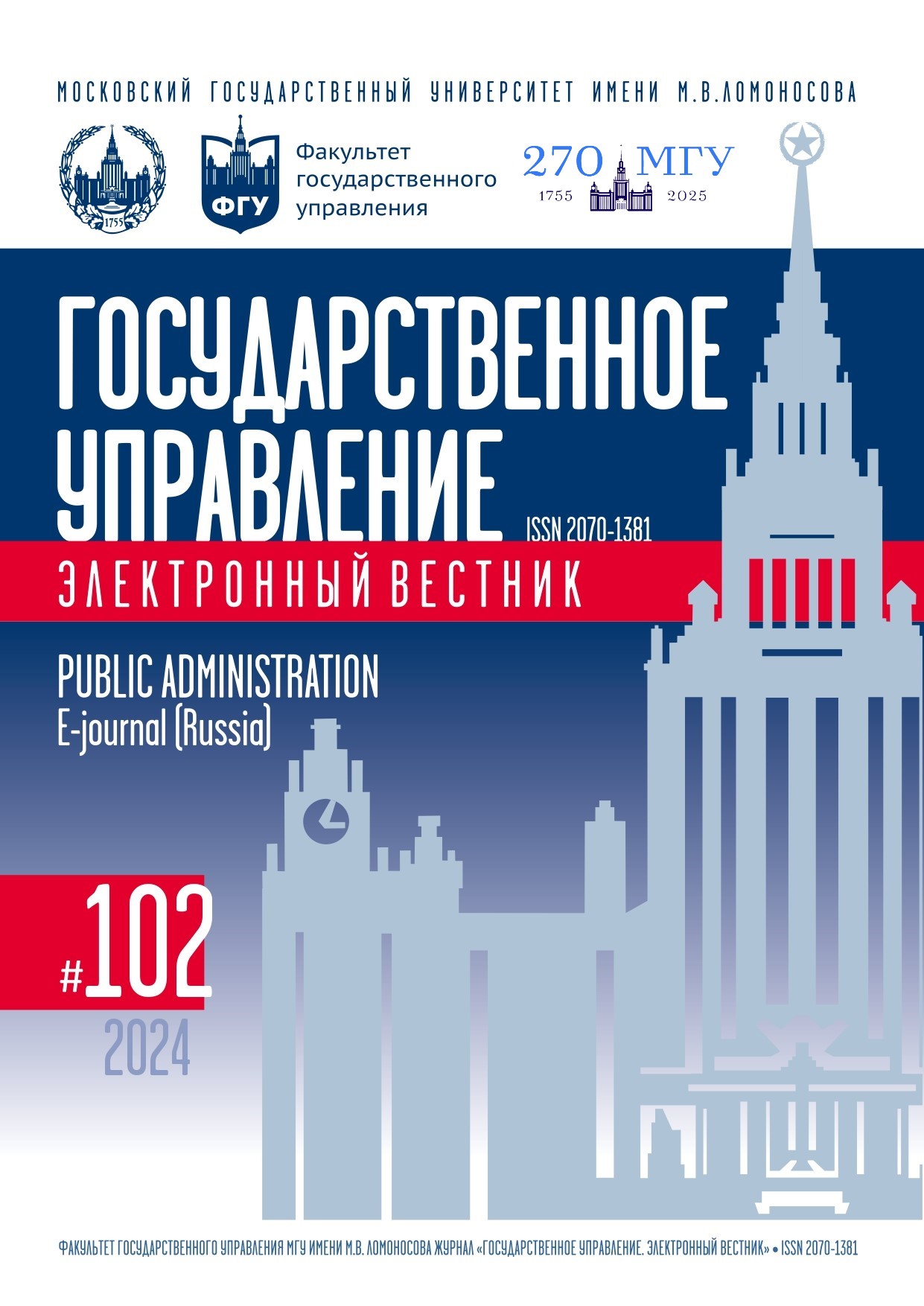Differentiation of Salaries due to Inequality of Opportunities in Russian Regions
Keywords:
Inequality of opportunity, differentiation of labor income, regional inequality, factors-circumstances, ex-ante approach.Abstract
Differentiation of an individual’s achievements includes, firstly, «fair» inequality caused by factors within the area of personal responsibility (effort, perseverance, etc.); secondly, the «unfair» one, caused by factors that the individual cannot control or change (male, age, place of birth, quality of upbringing, etc.). It is precisely reducing the second type of inequality — inequality of opportunities — that government policy measures should be aimed at. This research seeks to estimate the wage differentiation caused by inequality of opportunities using microdata (according to the sample observation by Rosstat). The factors-circumstances influencing the individual’s achievements included gender, age, size of the locality where the individual lives, lack of higher education. The study has revealed that the level of inequality of opportunity in Russia is decreasing, but regional disparities by this indicator do not change significantly. At the same time, the heterogeneity of the subjects of the Russian Federation in terms of the level of inequality of opportunities is higher than that of general inequality of labor income. The difference between the minimum and maximum overall salary differentiation index in 2021 was 5.5 times, while for inequality of opportunity the difference was 7.2 times. Inequality of opportunities explains at least 20–24% of total wage differentials.
References
Ибрагимова З.Ф., Франц М.В. Неравенство возможностей в Российской Федерации: измерение и оценка на микроданных // Прикладная эконометрика. 2019. Т. 54. С. 5–25. DOI: 10.24411/1993-7601-2019-10001
Ибрагимова З.Ф., Франц М.В. Неравенство возможностей: роль пространственного фактора // Пространственная экономика. 2020a. Т. 16. № 4. С. 44–67. DOI: 10.14530/se.2020.4.044-067
Ибрагимова З.Ф., Франц М.В. Неравенство возможностей: трактовка, методы и проблемы оценки // Вестник СПбГУ. Экономика. 2020b. Т. 36. № 4. С. 624–652. DOI: 10.21638/spbu05.2020.404
Ибрагимова З.Ф., Франц М.В. Неравенство возможностей: теория и практика измерения на микроданных RLMS-HSE // Экономическая политика. 2020c. Т. 15. № 1. С. 64–89. DOI: 10.18288/1994-5124-2020-1-64-89
Карцева М.А., Кузнецова П.О. Справедливое и несправедливое неравенство в России: оценка вклада неравенства возможностей в неравенство возможностей // Прикладная эконометрика. 2020. Т. 58. С. 5–31. DOI: 10.22394/1993 7601 2020 58 5-31
Aiyar S., Ebeke C. Inequality of Opportunity, Inequality of Income and Economic Growth // World Development. 2020. Vol. 136. DOI: 10.1016/j.worlddev.2020.105115
Alvarez A., Menendez A. Inequality of Opportunity and Income Inequality in Spain: An Analysis over Time // ECINEQ, Society for the Study of Economic Inequality. Working Paper Series 423. 2016. URL: https://ideas.repec.org/p/inq/inqwps/ecineq2016-423.html
Arneson R. Equality and Equal Opportunity for Welfare // Philosophical Studies. 1989. Vol. 56. Is. 1. P. 77–93.
Bourguignon F., Ferreira F., Menéndez M. Inequality of Outcomes and Inequality of Opportunities in Brazil // World Bank Policy Research Working Paper 3174. 2003. URL: https://documents1.worldbank.org/curated/ar/934871468770353839/101501322_20041117173001/additional/wps3174.pdf
Brunori P. The Perception of Inequality of Opportunity in Europe // The Review of Income and Wealth. 2017. Vol. 63. Is. 3. P. 464–491. DOI: 10.1111/roiw.12259
Carpantier J., Sapata C. An Ex-Post View of Inequality of Opportunity in France and Its Regions // Journal of Labor Research. 2013. Vol. 34. P. 281–311. DOI: 10.1007/s12122-013-9161-5
Checchi D., Peragine V. Regional Disparities and Inequality of Opportunity: The Case of Italy // IZA. Discussion Papers No. 1874. 2005. URL: https://docs.iza.org/dp1874.pdf
Checchi D., Peragine V. Inequality of Opportunity in Italy // Journal of Economic Inequality. 2010. Vol. 8. P. 429–450. DOI: 10.1007/s10888-009-9118-3
Cohen G. On the Currency of Egalitarian Justice // Ethics. 1989. Vol. 99. Is. 4. P. 906–944.
Dworkin R. What is Equality? Part 1: Equality of Welfare // Philosophy and Public Affairs. 1981a. Vol. 10. Is. 3. P. 185–246.
Dworkin R. What is Equality? Part 2: Equality of Resources // Philosophy and Public Affairs. 1981b. Vol. 10. Is. 4. P. 283–345.
Ferreira F., Gignoux J. The Measurement of Inequality of Opportunity: Theory and an Application to Latin America // The Review of Income and Wealth. 2011. Vol. 57. Is. 4. P. 622–657. DOI: 10.1111/j.1475-4991.2011.00467.x
Lucas R. On The Mechanics of Economic Development // Journal of Monetary Economics. 1988. Vol. 22. P. 3–42.
Paes de Barros R., Ferreira F., Molinas J., Saavedra J., De Car-valho M., Franco S., Freije- Rodriguez S., Gignoux J. Measuring Inequality of Opportunities in Latin America and the Caribbean. Washington DC: Palgrave Macmillan; World Bank, 2009.
Palomino J., Marrero G., Rodrigues J. Channels of Inequality of Opportunity: The Role of Education and Occupation in Europe // Social Indicators Research: An International and Interdisciplinary Journal for Quality-of-Life Measurement. 2018. Vol. 143. Is. 3. P. 1045–1074.
Perez-Mayo J. Inequality of Opportunity, a Matter of Space? // Regional Science Policy and Practice. 2019. Vol. 11. Is. 1. P. 71–87. DOI: 10.1111/rsp3.12181
Rawls J. A Theory of Justice. Cambridge, MA: Harvard University Press, 1971.
Roemer J. Equality of Opportunity. Cambridge, MA: Harvard University Press, 1998.
Scanlon T. The Significance of Choice // The Tanner Lectures on Human Values / ed. by Sterling M. McMurrin. Salt Lake City: University of Utah Press, 1988. Vol. 8. P. 149–216.
Tawney R. Equality. London: Unwin Books, 1964.
Voitchovsky S. Does the Profile of Income Inequality Matter for Economic Growth? // Journal of Economic Growth. 2005. Vol. 10. P. 273–296. DOI: 10.1007/s10887-005-3535-3

